There is no excuse for abuse. It’s a horrible thing to watch your friend’s life being devastated by their violent, manipulative, controlling partner. Though you’ve seen the red flags and try to help them get out of the awful situation—providing support and resources—the sad reality is that sometimes they don’t want your help.
One anonymous internet user asked the Mumsnet online community for their thoughts on an extremely sensitive situation. She explained how she went above and beyond to save her friend from her abusive husband. However, the woman eventually had to cut off her friend who accused her of having a ‘vendetta’ against her spouse. You’ll find the full story below.
Warning: mentions of emotional and other types of abuse.
It’s natural to want to help your friends who you see are being mistreated by their emotionally violent partners. Unfortunately, not everyone wants to be saved

Image credits: Anastasia Shuraeva / Pexels (not the actual photo)
A woman went online to share how she tried her best to get her friend out of an abusive marriage. However, things turned out differently than she’d hoped






Image credits: Crypto Crow / Pexels (not the actual photo)






Image credits: Ketut Subiyanto / Pexels (not the actual photo)




Image credits: Kaboompics.com / Pexels (not the actual photo)





Image credits: Liza Summer / Pexels (not the actual photo)






Image credits: Timur Weber / Pexels (not the actual photo)


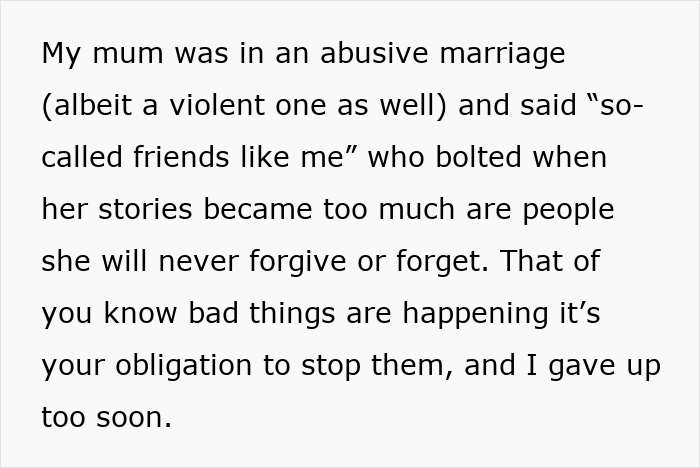

Image credits: TheIvyRestaurant
There are lots of different reasons why survivors of abuse choose to stay with their partners, from fear and intimidation to children and love
The National Domestic Violence Hotline notes that it takes a lot of courage to leave abusive relationships. “Abuse is about power and control. When a survivor leaves their abusive relationship, they threaten the power and control their partner has established over the survivor’s agency. This often causes the partner to retaliate in harmful ways.”
This is why leaving is “often the most dangerous period of time for survivors of abuse.” Aside from the physical risks, some survivors may choose to stay in the relationship because of:
- Fear of their partner or concern for their ability to be independent
- Growing up in a context where abuse was ‘normalized’ and not being able to recognize unhealthy behaviors
- Shame of having been mistreated
- Intimidation from their partner
- Low self-esteem and blaming themselves for their partner’s horrible behavior
- Lack of resources
- Disability
- Cultural context
- Children
- Love
Abuse isn’t just physical or emotional. There are other types of dangerous and controlling behaviors, too
According to Women Against Abuse, there are many different types of abuse, ranging from physical and emotional to sexual, technological, and even financial.
The most commonly recognized form of abuse—physical—takes the form of a person hitting, strangling, burning, and otherwise harming their partner. They might also damage their property, refuse them medical care, and force them to abuse substances.
Emotional abuse includes name-calling, insults, extreme jealousy, over-the-top blame, intimidation, shaming, isolation, humiliation, stalking, and controlling what the other person does, where they go, and who they meet.
Sexual violence revolves around power and can involve things ranging from human trafficking to harm, forced intimacy, and sabotaging birth control.
Technological abuse mainly focuses on using technology to control and stalk a person, such as monitoring their social media interactions, phone calls, and messages, tracking their devices, and demanding to know their passwords. Some abusers go as far as to hack into their partners’ emails and social media accounts.
Meanwhile, financially abusive individuals might try to prevent their partners from attending work, harass them at their workplace, damage their credit score, and control their finances in such a way as to prevent their independence.
It is paramount that you immediately contact the authorities if you think that you’re in danger
American Family Physician stresses the fact that partner violence is a crime. “ It’s not your fault if you are being abused, so don’t blame yourself. No one deserves to be abused. One in four women and one in nine men in the United States are victims of partner violence at some time. Partner violence can happen in any type of couple.”
If you find yourself in an abusive relationship, there are a few essential steps that you can take:
- Talk to people you trust, from family and friends to clergy and medical staff
- Know where your and your children’s important documents are in case you need to leave, and keep them in a safe place
- Make a plan to go to a safe place, like a family member’s home or a shelter
- Call the police the moment you feel you are in immediate danger
- Consider getting a legal order to protect you from your abuser
What would you do in such a delicate situation where a good friend of yours is stuck in a relationship with an emotionally violent person? How would you react if they refused your help? Have you ever had to leave an abusive relationship? This is an extremely sensitive topic, but if you feel like opening up, feel free to do so in the comments below.
Most readers thought the woman went above and beyond for her friend, and believed she was right to react the way she did




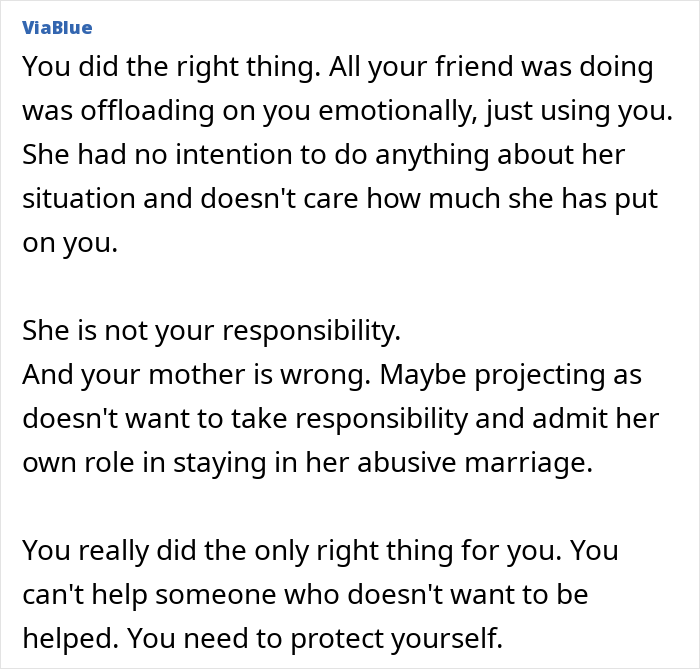




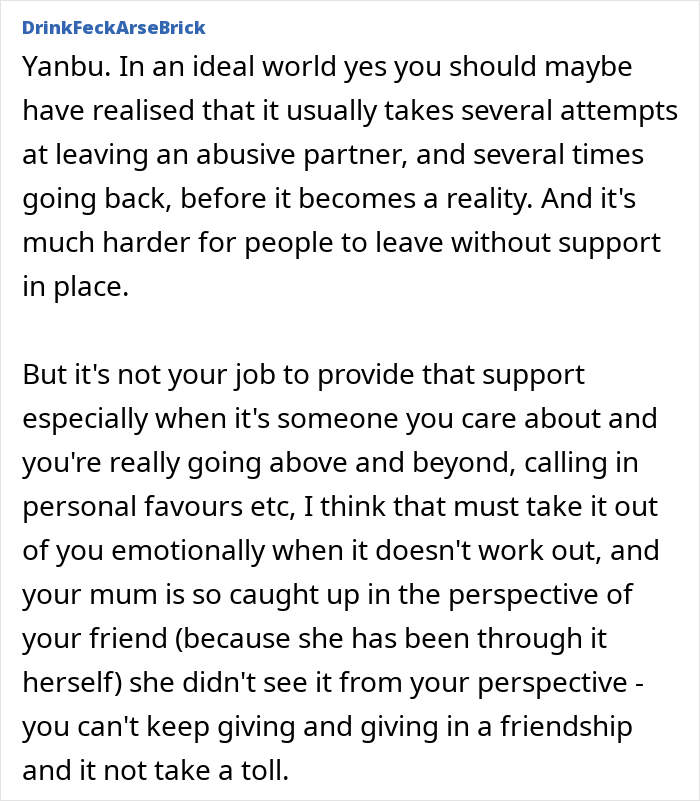
Some internet users thought that the author was being unreasonable. Here’s how they saw the situation

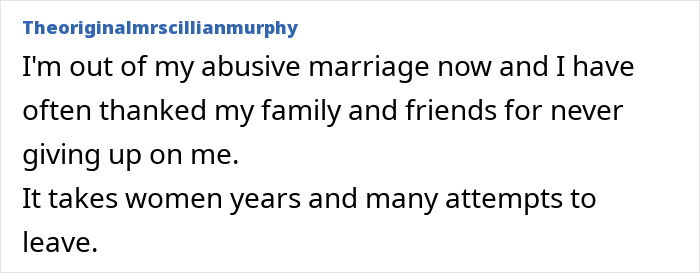





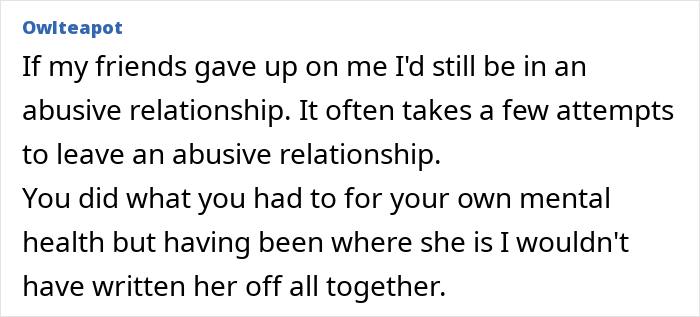
Later, the woman revealed more information about why she ended the friendship






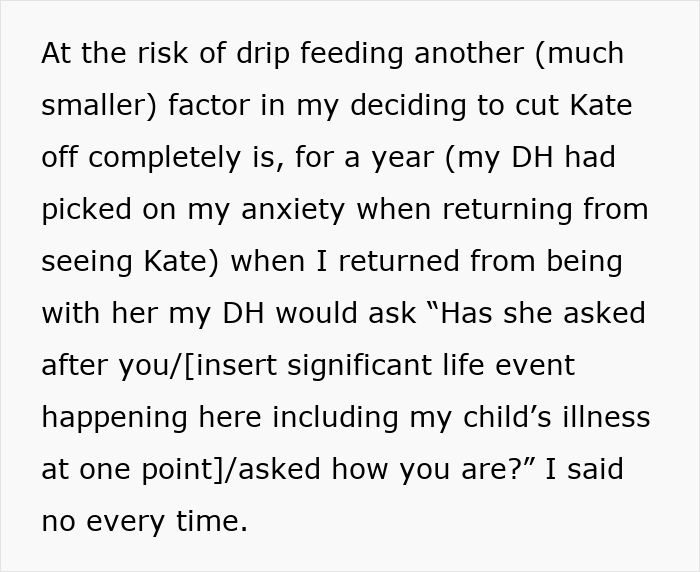
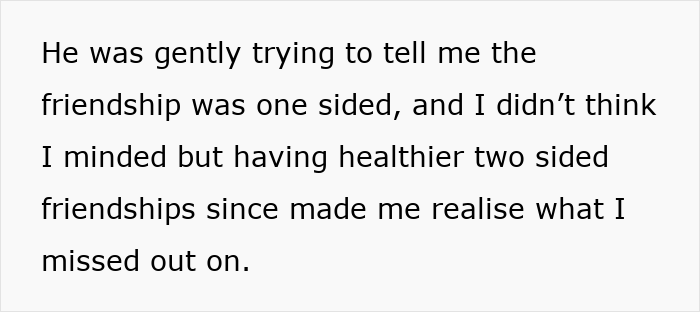
from Bored Panda https://ift.tt/PqrlWM6
via IFTTT source site : boredpanda